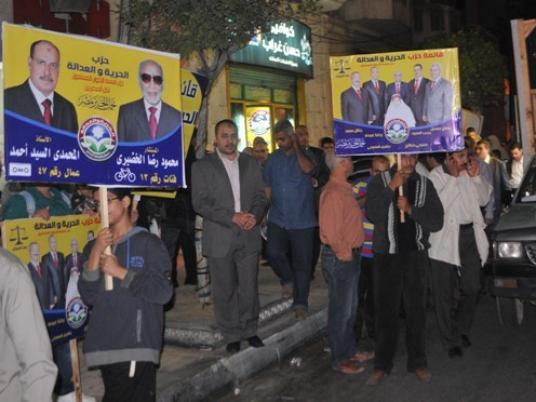Sudan’s president threatened Monday to expel foreign observers over their recommendations to delay the country’s first multiparty elections in decades due in April.
The April vote — Sudan’s first multiparty elections in decades — will see voters cast ballots for a national president, a southern president, local and national assemblies as well as governors.
President Omar al-Bashir, indicted by the International Criminal Court for crimes against humanity in Darfur, is running for re-election. He issued his warning while campaigning in east Sudan.
"Any foreigner or organization that demand the delay of elections will be expelled sooner rather than later," al-Bashir said in remarks carried by the pan-Arab Al-Jazeera television.
"We want them to observe the elections, but if they interfere in our affairs and demanded the delay, we will cut their fingers and put them under our shoes and expel them," he told supporters, according to his remarks carried by Al-Arabiya television web site."
In a report released last week, the Atlanta-based Carter Center, which has an election observer mission in Sudan, recommended a "minor" postponement in the vote over concerns Sudan’s election commission can deliver a successful vote on time.
The center said Sudan’s first competitive elections since 1986 "remains at risk on multiple fronts" including the ability of candidates to campaign freely and the impact of delayed preparations for the complex vote.
"It is increasingly unclear if the (National Election Commission) can deliver a successful election on time," the report said.
The election commission, however, has said the vote will go ahead as planned.
The Carter Center was invited by Sudan to observe the elections and has 12 long-term observers.
Other foreign observers are expected to arrive in the country before the April 11 vote.
Al-Bashir’s threat Monday echo his previous warnings to expel foreign aid groups following last year’s arrest warrant against him by the ICC for crimes against humanity in Darfur. He responded by expelling 13 large foreign aid agencies, most of them operating in Darfur, accusing them of spying for the court. The expulsions disrupted aid distribution and humanitarian work in the war-wrecked region.
Al-Bashir refused to deal with the court, and decided to run for re-election, a clear attempt to boost his legitimacy at home.
The New-York based Human Rights Watch said Monday political repression, continued insecurity in Darfur and arbitrary detention of campaigners threaten prospects for a free, fair, and credible vote.
"President al-Bashir is a fugitive from justice," said Georgette Gagnon, Africa director at Human Rights Watch. "He should be in The Hague answering to charges of heinous crimes committed in Darfur, not flouting Khartoum’s obligations to cooperate with the International Criminal Court."
The Netherlands-based ICC accuses al-Bashir of orchestrating atrocities against civilians in Darfur, where his Arab-led government has been battling ethnic African rebels since 2003. Up to 300,000 people have been killed and 2.7 million have been driven from their homes.
Meanwhile, the head of the UN-African Union peacekeeping mission in Darfur said Monday he expected elections in Darfur to go smoothly, despite fears of violence and calls for the poll’s delay.
Ibrahim Gambari, who took over the UNAMID mission in January, said he doesn’t think security will be "a major consideration."
"The security will be pretty good, if our experience in the registration period was anything to go by," he told The Associated Press after attending an international fundraising conference for Darfur in Cairo.
Gambari said an agreement between Sudan and Chad to stop supporting rebels in their respective countries, a general decline in fighting in Darfur and diminishing rebel control over territory have already had a positive impact on security.
He said UNAMID’s forces will help provide security for observers and the transportation of ballots in Darfur during the vote.
Voter registration in Darfur has exceeded 60 percent so far, despite calls from a major rebel group for its supporters to boycott the elections. Another rebel group, which signed a cease-fire agreement with the government last month, had asked authorities to postpone the vote so it can organize its supporters.
Human Rights Watch said continued insecurity in Darfur will be an obstacle to holding free and fair elections while large areas of Darfur remain inaccessible to election officials and candidates. It noted at least two cases in March when opposition party candidates were shot at and robbed.

